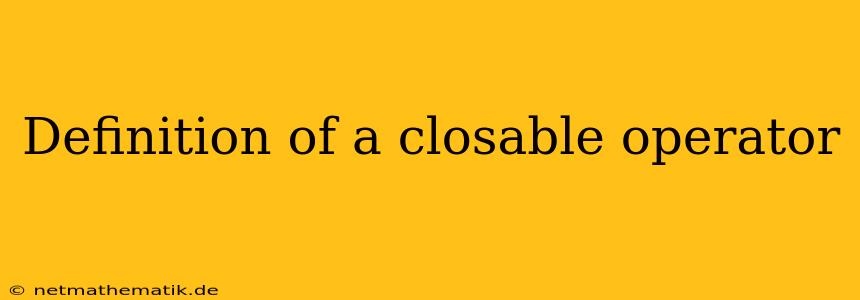In the realm of functional analysis, a fundamental concept that underpins the study of unbounded operators is that of a closable operator. This concept is crucial for understanding the behavior of operators that are not necessarily bounded, which are often encountered in applications like quantum mechanics and differential equations. To fully grasp the significance of a closable operator, we must delve into its definition and explore its key properties, which will shed light on the essential role it plays in the theory of unbounded operators.
Definition of a Closable Operator
A closable operator is a linear operator on a normed vector space that possesses a specific property related to its closure. To understand this concept, let's first define what we mean by the closure of an operator.
Definition: Let $T: D(T) \subset X \to Y$ be a linear operator from a subspace $D(T)$ of a normed vector space $X$ to a normed vector space $Y$. The closure of $T$, denoted by $\overline{T}$, is the operator defined as follows:
-
Domain of $\overline{T}$: The domain of $\overline{T}$, denoted by $D(\overline{T})$, consists of all vectors $x \in X$ for which there exists a sequence $(x_n)$ in $D(T)$ such that:
- $x_n \to x$ in $X$ (convergence in the norm of $X$).
- $Tx_n$ converges in $Y$.
-
Action of $\overline{T}$: For each $x \in D(\overline{T})$, $\overline{T}x$ is defined as the limit of the sequence $(Tx_n)$ in $Y$.
In simpler terms, the closure of an operator $T$ extends its action to a larger domain by "filling in the gaps" using limits. It takes into account the behavior of $T$ on sequences that converge to points outside its original domain.
Now, we are ready to define a closable operator:
Definition: A linear operator $T: D(T) \subset X \to Y$ is called closable if its closure $\overline{T}$ is well-defined, meaning that the limit $\lim_{n \to \infty} Tx_n$ is unique for all sequences $(x_n)$ in $D(T)$ that converge to the same point in $X$ and for which $Tx_n$ converges in $Y$.
Intuition: A closable operator is one that can be extended to a larger domain in a consistent way. This means that if two sequences in $D(T)$ converge to the same point in $X$ and their images under $T$ converge, then these images must converge to the same point in $Y$.
Importance of Closable Operators
The concept of a closable operator is crucial for several reasons:
-
Extending Unbounded Operators: Many important operators in analysis, such as differential operators, are unbounded. This means that they are not defined on the entire space, and their action on some vectors might be infinite. A closable operator allows us to extend these unbounded operators to larger domains, making them more amenable to analysis.
-
Existence of Adjoints: The concept of the adjoint operator is fundamental in functional analysis. For a closable operator $T$, its adjoint $T^*$ exists, and it plays a crucial role in understanding the properties of $T$.
-
Spectral Theory: In spectral theory, which studies the eigenvalues and eigenvectors of operators, the properties of closable operators are vital. For instance, the resolvent set of a closable operator can be analyzed, which provides information about its spectrum.
-
Applications: Closable operators are widely used in various areas of mathematics and physics, such as:
- Quantum Mechanics: The Hamiltonian operator, which describes the energy of a system, is often unbounded. Understanding its closure is essential for studying the dynamics of quantum systems.
- Differential Equations: Many differential operators are unbounded. Their closure is crucial for analyzing solutions to differential equations.
Properties of Closable Operators
Closable operators possess several important properties:
-
Closed Graph Theorem: A closed operator is closable. This theorem establishes a connection between closability and the concept of a closed graph, which is a graph that is closed in the product topology of the underlying spaces.
-
Closedness of the Graph: If $T$ is closable, then the graph of $\overline{T}$ is the closure of the graph of $T$. This property highlights the relationship between the closure of an operator and the closure of its graph.
-
Uniqueness of Closure: The closure of a closable operator is unique. This ensures that the extension of the operator is well-defined and consistent.
-
Dense Domain: A closable operator $T$ has a dense domain in $X$. This means that the domain of $T$ is "large enough" to allow for the closure to be defined.
Examples of Closable Operators
Here are some examples of closable operators:
-
Differential Operators: Let $X = C^1([0,1])$ be the space of continuously differentiable functions on the interval $[0,1]$ equipped with the sup norm, and let $Y = C([0,1])$ be the space of continuous functions on the same interval. The derivative operator $D: D(D) \subset X \to Y$, defined by $D(f) = f'$, where $D(D)$ is the set of all functions in $X$ that have a continuous derivative, is closable.
-
Multiplication Operators: Let $X = L^2([0,1])$ be the space of square-integrable functions on the interval $[0,1]$. The multiplication operator $M_f: D(M_f) \subset X \to X$, defined by $M_f(g) = f(x)g(x)$, where $f$ is a measurable function on $[0,1]$ and $D(M_f)$ is the set of all functions in $X$ for which the product $f(x)g(x)$ is also in $X$, is closable.
-
Unbounded Self-Adjoint Operators: A closable operator that is also self-adjoint is an important class of operators with many applications. The Hamiltonian operator in quantum mechanics is an example of an unbounded self-adjoint operator.
Conclusion
The concept of a closable operator is fundamental in functional analysis, particularly when dealing with unbounded operators. It allows us to extend the domain of such operators in a consistent way, making them more amenable to analysis. Understanding the properties and applications of closable operators is essential for studying a wide range of mathematical and physical phenomena, particularly in areas like quantum mechanics, differential equations, and spectral theory.
